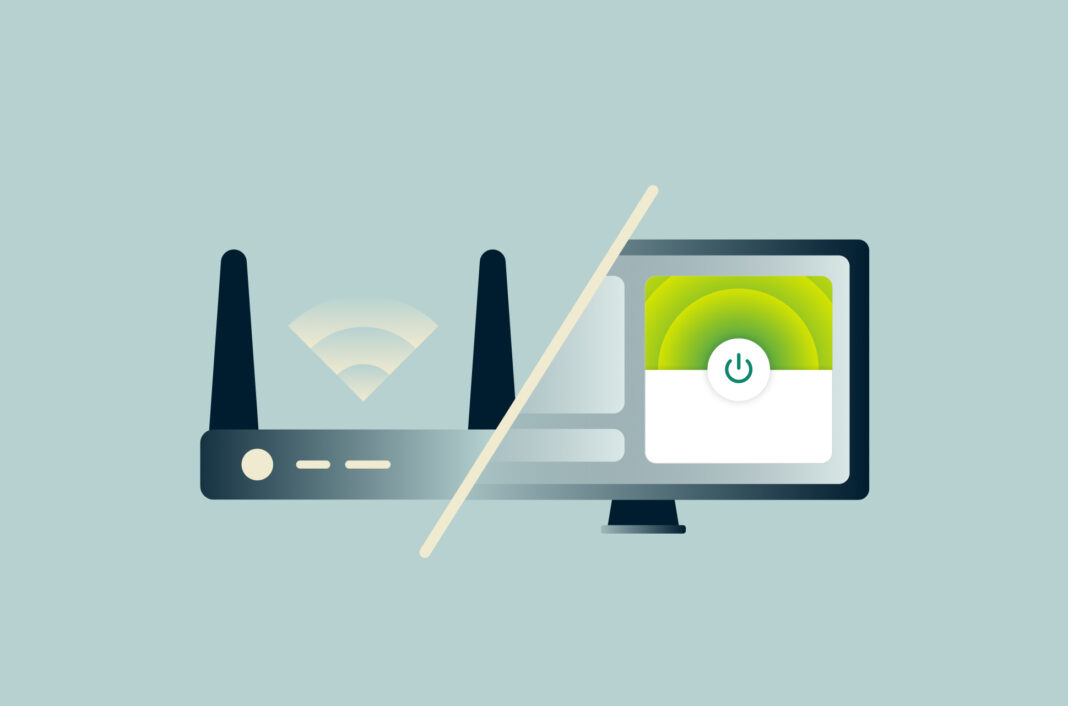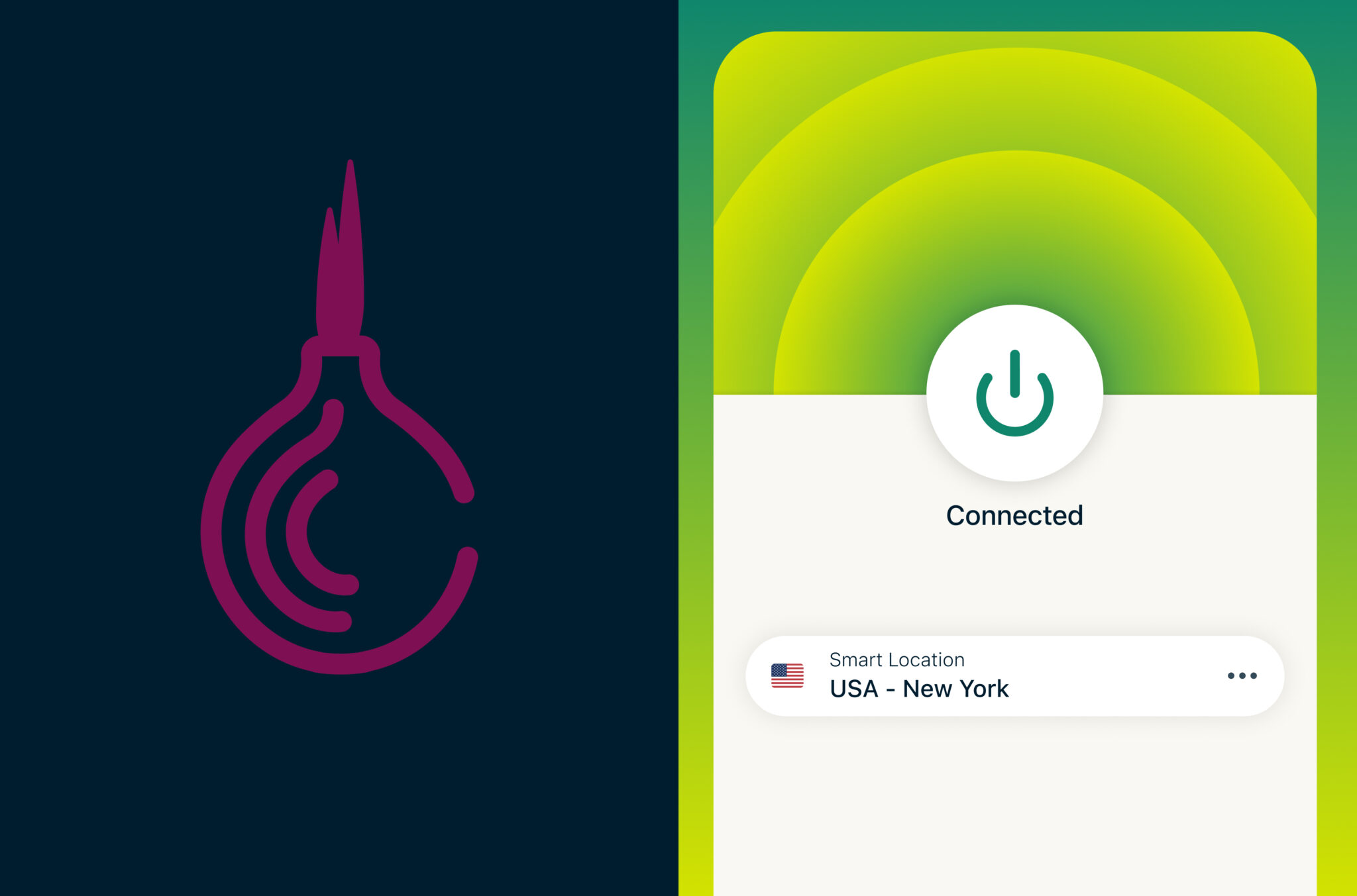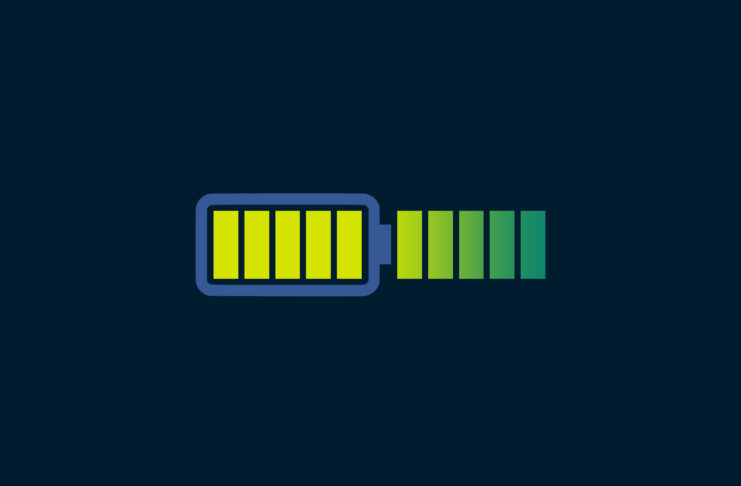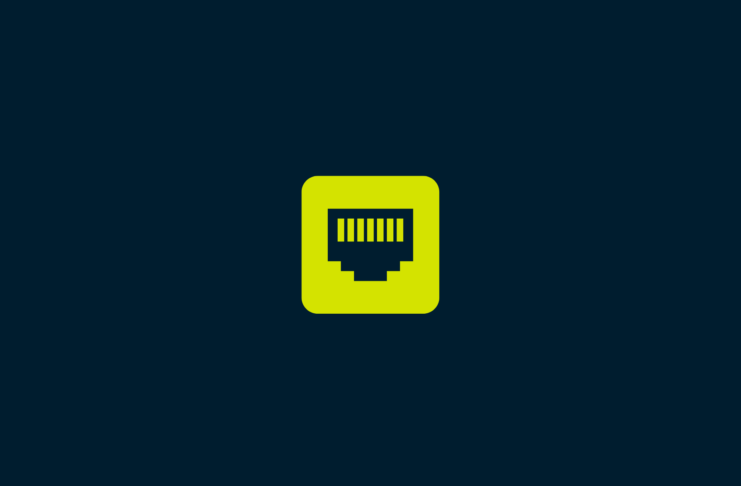Hardware and software VPNs work in different ways, but they both have one main goal: Improving online privacy. Hardware VPNs use dedicated physical devices like routers and physical firewalls to create secure connections across various network devices. On the other hand, software VPNs rely on applications to encrypt connections on individual devices, connecting them to remote servers.
These differences also translate into who uses them. Large companies usually opt for hardware VPNs due to their extensive networking needs. In contrast, individuals and small businesses find software VPNs more suitable for their security needs on a smaller scale.
When choosing between hardware and software VPNs, it’s important to weigh their security benefits, how fast they are, and their cost implications. To make this choice easier, we’ve cut through the noise and broken down the essentials so you can make a quick decision.
Jump to…
What is VPN hardware?
Benefits of using a hardware VPN
4 biggest disadvantages of using a hardware VPN
What is software VPN?
Benefits of using a software VPN
4 biggest disadvantages of using a hardware VPN
Hardware VPNs vs. Software VPNs: Key comparisons
Verdict: Should I choose VPN hardware or VPN software?
How do I choose the best hardware VPN device?
How do I choose the best software VPN device?
What is VPN hardware?
A hardware VPN is a physical device that establishes a secure connection between networks. This dedicated piece of equipment is designed to create a private and encrypted link between different networks. Unlike software-based VPNs, it doesn’t rely on individual installations.
Businesses and organizations commonly use hardware VPNs to ensure secure communication between different locations. For example, they might be used by companies with remote employees, branch offices, or collaborative partners. The hardware VPN ensures that data transmitted between these locations remains protected from potential threats.
Read more: Cybersecurity tips for small businesses
The main advantage of a hardware VPN is that it offers a centralized and robust approach to securing connections. It has its own dedicated processor to handle important functions like authentication and encryption, which adds an extra layer of protection to the data being exchanged.
However, it’s worth noting that setting up and maintaining a hardware VPN can be more complex than using software-based VPN solutions. It requires technical expertise and potentially higher costs due to the physical hardware involved.
The key components of a hardware VPN include:
- VPN gateway or router: This is the central device that manages the VPN connection and encrypts and decrypts traffic.
- Network interface cards (NICs): These cards provide the physical connection between the VPN gateway and the networks that it’s connecting.
- An encryption or decryption engine: This is the hardware that performs the encryption and decryption of traffic.
- Network switch: This device connects multiple devices to the VPN gateway and allows them to communicate with each other securely.
- Redundancy and high availability features: These features help to ensure that the VPN connection is always available, even if one of the components fails.
- Management interface: This allows you to configure and manage the VPN gateway.
- Authentication mechanisms: These mechanisms verify the identity of users and devices before they are allowed to connect to the VPN.
- Additional security features: These features can help to protect the VPN connection from attacks, such as intrusion detection and prevention systems.
- A load balancer: This device distributes traffic evenly across multiple VPN gateways, which can improve performance and reliability.
Who is hardware VPN best for?
Hardware VPNs are best suited for organizations that need a high level of security and performance, especially in contexts like:
- IoT security
- Remote work environments
- Government agencies
- Financial and healthcare institutions
- Supply chain security
- Military communications
- Department of Defence contractors
Benefits of using a hardware VPN
A hardware VPN comes with a handful of advantages, including heightened security and streamlined management:
Enhanced security
Hardware VPNs prioritize data protection and use dedicated hardware resources for encryption and authentication—a feature especially valued in industries that have to adhere to strict data protection and privacy regulations.
Optimized performance
With dedicated processing power and specialized components, hardware VPNs ensure faster data transfers, which is crucial for businesses managing substantial traffic or a large user base.
Centralized management
Hardware VPNs simplify administrative tasks. Their centralized management framework enables swift deployment, monitoring, and maintenance. IT administrators can efficiently manage security across branches or remote locations, saving time and resources.
Reliability and redundancy
Hardware VPNs ensure continuous operation and minimal downtime. Availability and redundancy components prevent disruptions.
Interoperability and compliance
Compatible with various devices, hardware VPNs meet compliance standards, ensuring data security and privacy.
4 biggest disadvantages of using a hardware VPN
While hardware VPNs come with some impressive benefits—especially for businesses—they’re not without their limitations. Here’s a breakdown of the cons to help you make an informed choice:
1. Higher cost
Hardware VPNs tend to be more expensive due to the need for dedicated hardware resources like VPN routers, switches, and firewalls.
2. Setup complexity
The setup and management of hardware VPNs require a deeper understanding of networking and security concepts. Updates are also complex and require the same level of expertise.
3. Limited features
Hardware VPNs may offer a restricted set of features compared to software VPNs. They also typically have limited servers.
4. Limited flexibility
Hardware VPNs may lack the scalability and customization options available with software VPNs.
What is VPN software?
VPN software refers to apps or programs that enable you to establish secure, encrypted connections via a VPN. Unlike hardware-based VPNs that require complex setups, VPN software simplifies the process: Just install an app on your device.
With software VPNs, data encryption takes place directly on your device, eliminating the need for separate hardware. This software is compatible with various systems such as Windows, macS, Linux, iOS, and Android. Some routers—like Aircove from ExpressVPN—even come with built-in VPN features.
The standout advantage of VPN software is its user-friendly approach to enhancing security. You don’t need to be a tech expert to install and activate it. Plus, the encryption process that takes place on your actual device adds an extra layer of protection to your data.
The key components of a software VPN include:
- Encryption: VPN software uses encryption to protect the data that is being transmitted over the VPN tunnel.
- Authentication: VPN software uses authentication to ensure that only authorized users can access the VPN.
- Routing: VPN software uses routing to ensure that data is routed through the VPN tunnel and not over the public network.
- Management: VPN software typically includes a management interface that allows users to configure the VPN settings and monitor VPN traffic.
- Split tunneling: This allows users to choose which traffic is routed through the VPN tunnel and which traffic is routed over the public network.
- Kill switch: This automatically disconnects the user’s device from the internet if the VPN connection drops.
- DNS leak protection: VPN software usually prevents DNS queries from being sent over the public network, which can help to protect the user’s privacy.
- WebRTC leak protection: WebRTC leak protection in VPN software can stop WebRTC traffic from going through the public network, enhancing user privacy.
Who needs a software VPN?
Software VPNs are best suited for individuals and small businesses that need a VPN for basic security and privacy needs, such as:
- Personal use: Software VPNs can be used to protect your and your family’s personal privacy and security when browsing the internet, using public Wi-Fi, or accessing work resources remotely.
- Small businesses: Software VPNs can be used by small businesses to provide secure access for employees and protect sensitive data.
Benefits of using a software VPN
From a user-friendly setup to compatibility across devices, as well as cost-effectiveness, here are the main benefits of using a software VPN:
User-friendly
No advanced technical knowledge is required to set up a software VPN, making it accessible to all users. It’s also easy to use, ensuring a hassle-free experience.
Compatibility
A software VPN offers flexibility and is compatible with a wide range of operating systems, ensuring it works seamlessly on nearly any device.
Cost-effective
Choosing VPN software is more affordable than investing in hardware options for securing your connections.
Versatile protocol support
VPN software usually supports a variety of versatile VPN protocols, such as OpenVPN, L2TP/IPsec, IKEv2/IPsec, and in ExpressVPN’s case, Lightway, enhancing the security and functionality of your connections.
Expansive server network
With a software VPN, you can benefit from a large network of servers located in various parts of the world, providing you with multiple connectivity options and stability.
Continuous enhancement
VPN software is regularly updated and improved to offer the latest security features and improvements.
Comprehensive cybersecurity
Some VPN software might be bundled with other cybersecurity tools, such as password managers, ad-blockers, and data leak prevention features, ensuring even greater protection.
Advanced customization
Software VPN usually has easily customizable settings and advanced features, tailoring the VPN to your specific needs.
4 biggest disadvantages of using a software VPN
Overall, VPN software can be a valuable tool for protecting your privacy and security online. However, it’s important to be aware of the potential disadvantages of VPN software before you use it:
1. Processing load
Software VPNs can make your internet a bit slower and use more of your device’s processing power due to encryption and routing. However, premium VPN services like ExpressVPN use optimized protocols and powerful infrastructure to ensure minimal impact on speed.
2. Software updates
You need to update your VPN software often to fix security vulnerabilities. If you don’t, your system could become an easy target for cyberattacks.
3. Incompatibility
Some software VPNs might not be compatible with all operating systems or devices. You might encounter issues when trying to set up a software VPN on less common platforms or older devices.
4. Multiple devices
If you have multiple devices that need VPN protection, managing software VPN installations on each device can become cumbersome. A router with VPN software can offer a more centralized and easier-to-manage solution.
Read more: How to set up a VPN on your router
Hardware VPNs vs. software VPNs: Key comparisons
Both hardware and software VPNs come with specific strengths suited to different user preferences, security needs, and operational demands.
VPN hardware vs. VPN software at a glance
| Hardware VPN | Software VPN | |
| Cost | 🔴 Expensive once-off price | 🟢 Relatively inexpensive |
| Speed | 🟢 Fast connection speeds | 🟢 Fast connection speeds |
| Scalability | 🟠 Pricey scalability options | 🟢 Easy scalability |
| Server locations | 🔴 Limited | 🟢 Widespread |
| Dedicated servers and IPs | 🟢 A common configuration | 🔴 Servers and IPs are often shared |
| Easy setup | 🔴 Complicated setup | 🟢 Fast and easy setup |
| Updates | 🔴 Manual and complex | 🟢 Automatic and effortless |
| Remote access | 🟢 Easy remote access | 🟠 Sometimes available |
| Processing load | 🟢 None | 🟢 Insignificant as long as you use a high-quality provider |
| Security | 🟢 Great internal privacy and security | 🟢 Great internal privacy and security |
| Overcoming censorship | 🔴 Unlikely to overcome censorship | 🟢 Quickly overcome censorship |
| Suitable for businesses | 🟢 Yes | 🟢 Yes |
| Suitable for individuals | 🔴 No | 🟢 Yes |
1. Cost
🏆 Winner: Software VPNs
| Hardware VPNs | Software VPNs |
| Hardware VPNs come with a price tag ranging from 50 USD to over 1,000 USD, alongside additional costs for setup and maintenance. They require technical specialists for configuration and are more suitable for larger businesses with bigger budgets. | Software VPNs usually involve a monthly, bi-annual, or annual subscription fee that offers affordable access, especially for basic features. They are well-suited for individuals and smaller businesses. Opting for long-term subscriptions can lead to significant savings. While there are free VPN options, be cautious of these due to potential security vulnerabilities. |
Read more: Should you use a free VPN?
2. Speed
🏆 Winner: Hardware VPNs
| Hardware VPNs | Software VPNs |
| Hardware VPNs excel in speed due to their dedicated hardware resources. They can manage numerous connections simultaneously and provide high-speed performance, making them essential for enterprise-level solutions. | Software VPNs might be marginally slower as they rely on user device resources. Despite this, their speed remains sufficient even for small businesses—especially high-quality software VPNs. |
3. Scalability
🏆 Winner: Software VPNs
| Hardware VPNs | Software VPNs |
| Scaling a hardware VPN isn’t seamless. For businesses, growth means adding more connections, which demands more resources. This leads to either upgrading to a pricier device or purchasing additional ones, incurring extra costs. | Software VPNs offer easy scalability. Each subscription supports multiple devices, making it likely to cover an entire household. Businesses might require multiple subscriptions, but this cost is lower than buying new hardware devices. |
4. Server locations
🏆 Winner: Software VPNs
| Hardware VPNs | Software VPNs |
| Hardware VPNs typically have a restricted selection of server locations, mainly in areas where a business has a physical presence or branches. | Software VPNs provide a notable advantage with a large number of server locations across numerous countries and cities across the globe. For example, ExpressVPN has server locations in 105 countries. |
5. Ease of use: Setup, maintenance, and updates
🏆 Winner: Software VPNs
| Hardware VPNs | Software VPNs | |
| Setup | Hardware VPNs involve a complex setup process. You need to purchase, ship, and physically install the device, which can be time-consuming. Not all hardware VPNs have user-friendly interfaces, making setup difficult for non-technical users. | Software VPNs offer quick and simple setup. They’re available instantly, often with a small download size. Installation is designed for easy use, even for those without technical skills. |
| Maintenance | Hardware VPNs require ongoing maintenance. Tasks like firmware updates, hardware component replacements, and continuous network monitoring are managed by IT experts. As your network grows, this maintenance becomes more complex. | Software VPNs need minimal user maintenance. The VPN provider handles most updates and bug fixes. |
| Updates | Hardware VPNs often lack automatic updates. Users must find and apply updates manually, which can be time-consuming and challenging for non-technical individuals. | Software VPNs shine in this area. Many providers include automatic updates in their software, making it effortless for users to stay current. These updates enhance features and improve security. |
6. Remote access
🏆 Winner: Hardware VPNs
| Hardware VPNs | Software VPNs |
| Hardware VPNs excel in providing secure remote access to a company’s intranet from external locations. This feature is valuable for maintaining encrypted connections to internal resources while employees are away from the office. However, setting up remote access with hardware VPNs is not straightforward. It requires technical expertise and can be complex. This makes it more suitable for companies with an IT team capable of utilizing screen sharing to establish remote access for employees. | Software VPNs have some challenges for businesses and organizations when it comes to remote access. An important issue is the use of dynamic IP addresses. When connecting to a VPN server, your IP address might change every time. This makes consistent identification tricky for companies. To solve this, some software VPN providers offer dedicated or static IP addresses as a solution, which can then be whitelisted for better control. |
7. Computer load
🏆 Winner: Hardware VPNs
| Hardware VPNs | Software VPNs |
| In the past, hardware VPNs gained popularity due to their ability to alleviate the strain on computer resources. Encryption, a crucial component of data security, requires processing power. Hardware VPNs utilize specialized devices with dedicated processors, reducing the load on connected computers. | While software VPNs have come a long way in minimizing their impact on computer resources, it’s worth noting that they can still have some effects on processing load. The process of encryption and routing that software VPNs carry out can potentially result in a slight decrease in internet speed and a moderate increase in the use of your device’s processing power. However, high-quality VPN services like ExpressVPN, for instance, have taken measures to mitigate these effects. |
8. Security
🏆 Winner: Tie
| Hardware VPNs | Software VPNs |
| Hardware and software VPNs are relatively comparable in terms of security. However, there’s an emerging concern with security vulnerabilities in hardware VPN servers being exploited by hackers. When a manufacturer’s device is found to be vulnerable, it puts all users of that brand’s devices at risk. While patches are issued, the deployment process can disrupt daily operations, causing delays in implementing necessary updates. | On the software VPN side, the primary security challenge lies in selecting a trustworthy provider. Past academic research has found that 38% of free VPNs contain malware, and a significant 72% track users’ online activities. To ensure security, both businesses and individual users should consider services’ privacy policies and opt for reputable paid software VPNs like ExpressVPN. One advantage of software VPNs is that users aren’t responsible for maintaining the infrastructure, which contributes to security in several ways. VPN developers possess extensive expertise in VPNs and security, and they are vigilant about promptly addressing vulnerabilities. When client patches are released, they are straightforward to install, minimizing potential security gaps. |
Verdict: Should I choose VPN hardware or VPN software?
While a software VPN offers more benefits, choosing between a hardware VPN and a software VPN depends on your specific circumstances. For example, larger organizations often find hardware VPNs better suited to their needs, while individuals and smaller entities lean towards the convenience and accessibility of software VPNs.
When making your decision, here are some key factors to take into account:
- The size of your organization: If you have a small organization with a few users or you’re looking for a VPN for personal use at home, a software VPN is sufficient. However, if you have a large organization with many users, a hardware VPN may be a better option.
- The types of security you need: If you need high levels of customizable security or are in an industry that needs to adhere to compliance, a hardware VPN is the best option. However, if you are looking for a high standard of security that fits general needs, a software VPN would provide greater affordability and ease of use.
- The complexity of your network: If you have a complex network with a lot of users, a hardware VPN may be easier to manage than a software VPN.
Do you prefer using a hardware or software VPN? Tell us in the comments below.
How do I choose the best VPN hardware device?
When it comes to selecting the best VPN hardware device for your needs, there are a few key factors to keep in mind:
- Concurrent connections: The device should handle the number of VPN connections you expect to use simultaneously without slowing down.
- Protocol compatibility and encryption: Look for support for common protocols like OpenVPN, IPSec, or SSL/TLS, and strong encryption using AES algorithms to protect your data.
- Security features: Ensure the device comes with built-in firewalls, Intrusion Detection and Prevention Systems (IDS/IPS), content filtering, and malware protection to enhance security.
- Integration with infrastructure: Check if the device can seamlessly work with your existing network setup, including regular and VPN routers, switches, and other security devices.
- Vendor reliability: Choose a device from a reputable vendor with a solid track record. This ensures you’ll receive ongoing support, updates, and security patches.
Here are a few examples of VPN hardware manufacturers and their models that have been certified by the National Information Assurance Partnership (NIAP)—a commercial cybersecurity product certification that is mandated by federal procurement requirements for use in U.S. National Security Systems (NSS):
- PacStar 351, 451, 455, or 551: These tough VPN appliances are built for challenging environments and meet the NSA’s Common Criteria security requirements.
- SonicWall: A recognized brand in firewall and VPN appliances, offering a range of products suitable for businesses of all sizes.
- Cisco IR1101 Integrated Services Router: A high-performance router that can also work as a VPN gateway, ideal for businesses needing site-to-site VPN connectivity.
- Archon’s GoSilent Hardware VPN: A compact and portable VPN appliance that’s easy to set up, designed for businesses requiring secure connections for remote workers.
There are various other NIAP-certified VPN hardware options out there, so be sure to do your homework. Your decision should be based on your specific needs and budget.
How do I choose the best VPN software device?
There are many VPN services available, so it can be tough to know which one is right for you. But if you’re looking for ease of use with solid security, choose ExpressVPN.
- No logs: Your privacy matters. ExpressVPN is committed to not recording your internet traffic, ensuring your online activities remain private.
- Diverse server locations: Get a different IP address by connecting to one of ExpressVPN’s 105 server locations across the globe. Break through censorship and get unrestricted access.
- Blazing speeds: Enjoy high-speed streaming with ExpressVPN’s optimized network. Our range of protocols, including the innovative Lightway, ensures smooth online activities.
- Kill switch: Protect your data even when your VPN connection drops. ExpressVPN’s Network Lock stops all traffic in case of a disconnection.
- Strong encryption: Shield your online presence with 256-bit encryption, guarding against potential attackers, corporations, and prying eyes.
- Device coverage: Whether it’s Android, iOS, laptop, or router, ExpressVPN’s apps have you covered across all your devices.
- Tech expert approval: With a proven track record since 2009, ExpressVPN is a trusted choice. Tech experts and independent audits recognize our commitment to privacy.
- 24/7 customer support: ExpressVPN’s customer support is available round the clock to assist you with any concerns you might have.
FAQ: About hardware VPN vs. software VPN
Is a hardware VPN better?
Whether a hardware VPN is better depends on your specific needs and requirements. In general, hardware VPNs are a better choice for organizations with large numbers of users and complex security requirements. Software VPNs are a better choice for individuals and small businesses who prefer user-friendly technology and have limited budgets.
Here are some specific scenarios where a hardware VPN may be a better choice than a software VPN:
– Large organizations with a lot of remote users-
– Companies that need to comply with strict security regulations
– Organizations that need to protect more sensitive data
– Companies that need high-performance VPN connections
How do I set up a hardware VPN?
Before you set up a hardware VPN, it’s important to note that hardware VPNs are more complex to set up than software VPNs. This is because hardware VPNs require more configuration and may need to be customized to meet the specific needs of the organization. So, if you’re not comfortable setting up a hardware VPN yourself, we recommend you hire a professional to do it for you.
Here are the steps on how to set up a hardware VPN
*1. Choose a hardware VPN that meets your needs There are many different hardware VPNs available, so it’s important to choose one that’s right for your organization. Consider the number of users, the level of security required, and the budget when making your decision
*2. Configure the hardware VPN:Once you’ve chosen a hardware VPN, you will need to configure it. This process will vary depending on the specific VPN you have chosen. However, most hardware VPNs will require you to enter the following information:
– The IP address of the VPN server
– The username and password for the VPN server
– The encryption protocol to be used
– The port number to be used
*3.Connect the hardware VPN to your network: Once the hardware VPN is configured, you will need to connect it to your network. This can be done by connecting the VPN to your router or switch.
*4. Configure your devices to use the VPN: Once the hardware VPN is connected to your network, you will need to configure your devices to use the VPN. This process will vary depending on the device you are using. However, this process will vary depending on the device.
Once your devices are configured to use the VPN, you will be able to connect to the VPN and enjoy the benefits of a secure and private connection.
How much is a hardware VPN?
The price of a hardware VPN varies depending on the features and capabilities of the device. In general, hardware VPNs are more expensive than software VPNs. Some of the factors that affect the price of a hardware VPN include:
– The number of VPN users: The more VPN users that the device can support, the more expensive it will be.
– The speed of the VPN traffic: The faster the VPN traffic, the more expensive the device will be.
– The security features of the device: The more security features the device has, the more expensive it will be.
– The brand name of the device: Some brands are more expensive than others.
If you are looking for a basic hardware VPN for a small number of users, you can expect to pay a few hundred U.S. dollars. If you are looking for a high-performance hardware VPN for a large number of users, you can expect to pay several thousand U.S. dollars.
Is it illegal for foreigners to use VPN in China?
No, using a VPN as a foreigner or local in China isn’t officially considered illegal. However, only government-approved VPNs are allowed. Using non-government-approved VPNs has resulted in fines for some individuals, although these cases are more common among Chinese citizens and businesses than foreign nationals.
Do I need equipment for a VPN?
No, you don’t necessarily need equipment for a VPN—it depends on the type of VPN you want to use. For example, if you opt for a software VPN, there’s no requirement for additional equipment. A software VPN is installed directly on your device—whether it’s a computer, smartphone, or tablet. On these devices, you can simply download a VPN app.
On the other hand, a hardware VPN is a physical device that gets integrated into your network infrastructure. This type of VPN is typically favored by businesses and organizations that aim to safeguard a large number of devices. To utilize a hardware VPN, you’ll need to make a purchase and go through the installation process to set it up properly.
Is hardware VPN faster than software VPN?
Yes, hardware VPNs are generally considered faster than software VPNs due to their dedicated hardware for encryption. However, it’s important to note that high-quality software VPN providers, such as ExpressVPN, have invested in advanced technologies to optimize their performance. These providers employ efficient encryption algorithms and utilize powerful server networks strategically located around the world. As a result, top-tier software VPNs can also deliver impressive speeds while maintaining a high level of security and privacy.
Can you use a VPN on a router?
Yes, you can use a VPN on a router. However, only selected routers support VPN functionalities. For example, you can set up ExpressVPN on these compatible routers:
– Asus RT-AC56(U/R/S)
– Asus RT-AC68U (up to v3)
– Asus RT-AC87U
– Linksys EA6200
– Linksys WRT1200AC
– Linksys WRT1900ACS
– Linksys WRT1900ACS V2
– Linksys WRT1900AC 13J1
– Linksys WRT1900AC 13J2
– Linksys WRT3200ACM
– Linksys WRT32X
– Netgear R6300v2
– Netgear Nighthawk R6400v2
– Netgear Nighthawk R6700v3
– Netgear Nighthawk R7000
– Netgear Nighthawk R7000P
Additionally, the following routers can be manually configured to connect to ExpressVPN:
– Asus (other models)
– D-Link
– DD-WRT
– Netduma
– Sabai
– Tomato
– TP-Link
– Xiaomi
Better yet, you can get a router that has built-in router functionality. Aircove is the first and only Wi-Fi router on the market that is specially built to connect to ExpressVPN directly. This allows the router to provide VPN functionality to every device that connects to it.
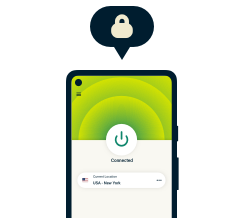
Protect your online privacy and security
30-day money-back guarantee

